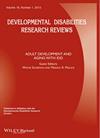Chris Feudtner, Jeffrey P. Brosco
{"title":"Do people with intellectual disability require special human subjects research protections? The interplay of history, ethics, and policy","authors":"Chris Feudtner, Jeffrey P. Brosco","doi":"10.1002/ddrr.139","DOIUrl":null,"url":null,"abstract":"<p>People with intellectual disability (ID) have a long history of discrimination and stigmatization, and a more recent history of pride and self-advocacy. The early history suggests that people with ID are a vulnerable population and deserve special research protections as do some other groups; the disability rights movement of the late 20th century aligns people with ID more closely with the principle of autonomy that has guided clinical and research ethics for the last 40 years. In examining the history of people with ID and the prevailing framework of human subjects research protections in the United States, we conclude that people with ID do not require special protection in human subjects research. The protections that have already been put in place for all individuals, if conscientiously and effectively implemented, achieve the right balance between safeguarding the interest of human research subjects and empowering individuals who choose to do so to participate in research. © 2012 Wiley Periodicals, Inc. Dev Disabil Res Rev 2011; 17:52–56.</p>","PeriodicalId":55176,"journal":{"name":"Developmental Disabilities Research Reviews","volume":"17 1","pages":"52-56"},"PeriodicalIF":0.0000,"publicationDate":"2012-03-23","publicationTypes":"Journal Article","fieldsOfStudy":null,"isOpenAccess":false,"openAccessPdf":"https://sci-hub-pdf.com/10.1002/ddrr.139","citationCount":"10","resultStr":null,"platform":"Semanticscholar","paperid":null,"PeriodicalName":"Developmental Disabilities Research Reviews","FirstCategoryId":"1085","ListUrlMain":"https://onlinelibrary.wiley.com/doi/10.1002/ddrr.139","RegionNum":0,"RegionCategory":null,"ArticlePicture":[],"TitleCN":null,"AbstractTextCN":null,"PMCID":null,"EPubDate":"","PubModel":"","JCR":"","JCRName":"","Score":null,"Total":0}
引用次数: 10
Abstract
People with intellectual disability (ID) have a long history of discrimination and stigmatization, and a more recent history of pride and self-advocacy. The early history suggests that people with ID are a vulnerable population and deserve special research protections as do some other groups; the disability rights movement of the late 20th century aligns people with ID more closely with the principle of autonomy that has guided clinical and research ethics for the last 40 years. In examining the history of people with ID and the prevailing framework of human subjects research protections in the United States, we conclude that people with ID do not require special protection in human subjects research. The protections that have already been put in place for all individuals, if conscientiously and effectively implemented, achieve the right balance between safeguarding the interest of human research subjects and empowering individuals who choose to do so to participate in research. © 2012 Wiley Periodicals, Inc. Dev Disabil Res Rev 2011; 17:52–56.
智障人士需要特殊的人类受试者研究保护吗?历史、伦理和政策的相互作用
智障人士长期以来一直受到歧视和污名化,但最近才有了自豪和自我宣传的历史。早期的历史表明,有身份证的人是一个弱势群体,应该像其他一些群体一样得到特殊的研究保护;20世纪后期的残疾人权利运动将ID患者与自主原则更紧密地联系在一起,这一原则在过去40年里指导了临床和研究伦理。在研究ID患者的历史和美国人类受试者研究保护的主流框架时,我们得出结论,ID患者在人类受试者研究中不需要特殊保护。已经为所有个人提供的保护,如果认真有效地实施,可以在维护人类研究受试者的利益和授权选择这样做的个人参与研究之间取得适当的平衡。©2012 Wiley期刊公司Dev disability Res Rev 2011;17:52-56。
本文章由计算机程序翻译,如有差异,请以英文原文为准。

 求助内容:
求助内容: 应助结果提醒方式:
应助结果提醒方式:


